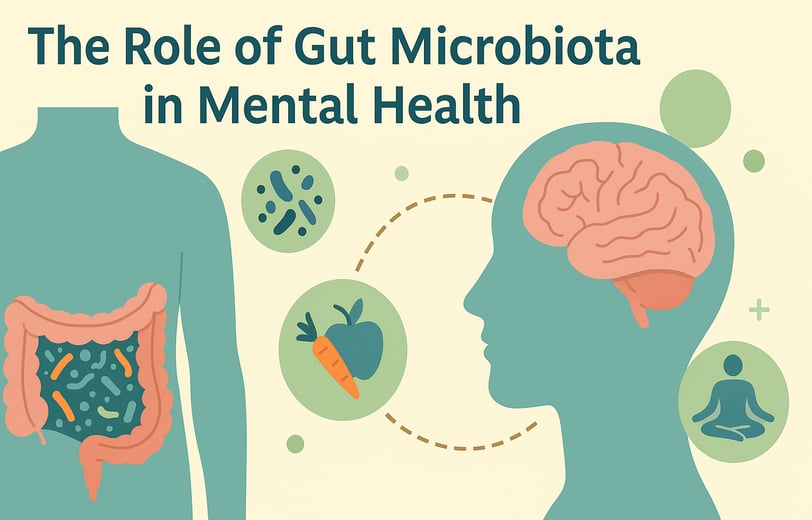Gut Health for a Better Mind: How the Microbiome Impacts Mental Wellness
Discover how your gut health affects your mood, stress levels, and mental clarity. Learn about the gut-brain axis, evidence-based nutrition tips, and the best supplements to support your microbiome and emotional well-being.
5/17/20253 min read


The Role of Gut Microbiota in Mental Health
Exploring the Gut-Brain Axis and Its Nutritional Implications
When we talk about mental health, we usually think of the brain as the starting point. But science now paints a much bigger picture—one that includes the trillions of microbes living in our gut. The gut-brain axis is a two-way communication network between your gut and central nervous system, and it's increasingly being recognized as a major player in mood regulation, anxiety, depression, and overall cognitive function.
From neurotransmitter production to immune regulation, the gut microbiota impacts your mental well-being in ways we’re only beginning to fully understand. With the right nutrition, lifestyle choices, and targeted supplementation, this axis can be supported and optimized—naturally.
Understanding the Gut-Brain Axis
The gut and brain are connected via the vagus nerve, hormonal pathways, and the immune system. Microbes in your gut don’t just help digest food—they produce short-chain fatty acids (like butyrate), synthesize neurotransmitters (such as GABA and serotonin), and influence your stress response via the hypothalamic-pituitary-adrenal (HPA) axis.
Key microbial strains like Bifidobacterium longum and Lactobacillus rhamnosus have been shown in both animal and human studies to reduce symptoms of anxiety and depression. These bacteria work by dampening inflammation, modulating cortisol levels, and improving gut barrier function, which plays a key role in regulating mood and energy levels.
What the Research Says
Animal studies have been particularly compelling. For example, transferring the gut bacteria from depressed humans into germ-free mice has been shown to cause depression-like behaviors in the animals—a strong suggestion that the microbiota can directly influence mood.
In humans, a study from Leiden University found that daily intake of a multi-strain probiotic significantly reduced negative thoughts in healthy adults after just four weeks. Another meta-analysis concluded that probiotics, especially multi-strain blends, can help reduce symptoms of anxiety in both clinical and non-clinical populations.
Expert Perspectives
According to Dr. Valerie Taylor, a psychiatrist and researcher at the University of Calgary, “We’re seeing a shift in how we approach mental health. Nutrition and gut health are no longer fringe topics—they’re foundational.”
She recommends three key dietary strategies:
A Mediterranean-style diet rich in fruits, vegetables, whole grains, and healthy fats.
Daily inclusion of fermented foods like kefir, sauerkraut, or miso to introduce beneficial bacteria.
Minimizing ultra-processed foods, which can disturb microbiome diversity and trigger inflammation.
Dr. Taylor also stresses that while supplementation can help, it’s most effective when paired with an already healthy diet and lifestyle.
Practical Applications
Improving your gut health doesn’t have to be complicated. Here are a few strategies you can start implementing immediately:
Eat more fiber. Prebiotic fibers (from foods like garlic, onions, bananas, and oats) feed good bacteria and increase SCFA production.
Incorporate fermented foods. These naturally contain live cultures that support microbial diversity.
Get regular exercise and quality sleep. Both are shown to positively affect microbiota balance.
Manage stress. Chronic stress is known to damage the gut lining and reduce bacterial diversity.
For those looking to go further, targeted supplementation can be an excellent addition—especially if you’re dealing with anxiety, low energy, or gut discomfort.
Products we would recommend:
Here are three science-backed supplements that support both gut and mental health. You can easily insert your affiliate links next to the product names.
1. Physician’s Choice Probiotic – 60 Billion CFU
A top-rated daily probiotic with 10 strains plus organic prebiotics. Helps restore gut balance and improve digestion and immunity—essential for mood stability.
Great for: Daily foundational gut support
https://amzn.to/44K4inc
2. OMNi-Biotic Stress Release
A psychobiotic formula shown in clinical trials to reduce stress and support the gut-brain connection. Comes in travel-friendly powder sachets.
Great for: Stress resilience and emotional balance
https://amzn.to/4mrKADk
3. BIOHM Gut-Brain Connection Supplement
Combines probiotics with brain-boosting ingredients like Lion’s Mane and Bacopa for focus and clarity.
Great for: Cognitive performance + gut health
https://amzn.to/45cHRXV
Final Thoughts
The relationship between gut microbiota and mental health is one of the most exciting frontiers in both neuroscience and nutrition. With a healthy gut, you're better equipped to handle stress, regulate mood, and even support cognitive function.
Start with food: load your meals with fiber-rich vegetables, whole grains, and fermented products. Pair that with intentional habits like better sleep and movement. Then, consider adding a high-quality supplement that targets your specific needs—whether it's overall gut balance, stress reduction, or focus enhancement.
The science is young but powerful—and it points to a simple truth: a healthier mind begins in the gut.
FITNESS
Nutrition
WellnesS
info@movebetterco.com
© 2025. All rights reserved | Privacy Policy | Terms & Conditions